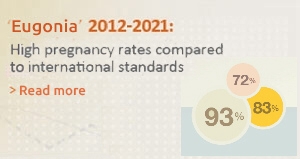PGD allows the identifications of genetic abnormalities of the embryo while it develops in culture. The method detects certain genetic abnormalities in the embryo, which are responsible for known congenital or hereditary diseases.
Embryos that undergo PGD are biopsied on Day 3 after oocyte retrieval. The embryos are first placed in a special solution to loosen the intercellular bonds. Then a small opening is created on the zona pelucida using laser, and using a special micropipette one cell (blastomere) is removed from each embryo. The biopsied cell will undergo genetic analysis, while the remaining embryo will continue to develop in culture. It has been observed that the removal of a single blastomere at this stage of embryonic development does not adversely affect embryo viability.
With PGD, we identify specific gene mutations (using polymerase chain reaction, PCR), and structural or numerical chromosome abnormalities (using FISH, fluorescent in situ hybridization). The abnormal embryos are therefore identified and excluded from the embryo transfer. Only healthy embryos are selected for transfer in the uterus, at the blastocyst stage on day 5 or 6. If the gene causing a genetic disease is located on a sex chromosome, then sex selection is required to avoid development of the disease in the embryo. This is the only case when sex selection is performed.
Cases that require PGD include -thalassaemia, cystic fibrosis, Down syndrome, etc.Thanks to the continuous evolution of genetic analysis technology, an increasing number of genes responsible for hereditary diseases can be identified, helping us to avoid even more genetic diseases, even some forms of cancer.
PGD has an advantage over conventional prenatal diagnosis methods, ie amnioparacentisis and trophoblast biopsy, as it can avoid potential abortion if the diagnosis is positive for a certain abnormality.
It must be clear that PGD searches for specific abnormalities and does not preclude the birth of a child with a different genetic disease. It is necessary that all couples who are candidates for PGD seek genetic consultation by a geneticist. The scientific team at Eugonia has the required training and expertise to offer PGD for the prevention of genetic diseases.































